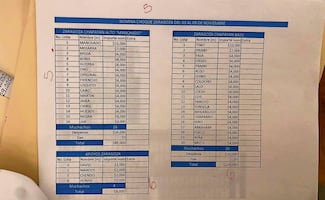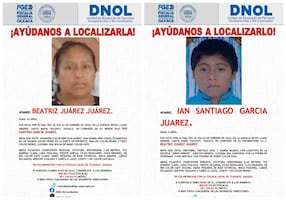Más Información

VIDEO: Avión militar con miles de pesos en efectivo se accidenta en Bolivia; policía dispersa con gas lacrimógeno rapiña

Artículo 19 exige investigación y protección al comunicador Víctor Badillo; fue atacado en instalaciones de su medio en Nuevo León

Hallan cuerpos de dos mujeres en caminos de terracería en Silao e Irapuato; difunden fichas de búsqueda de otras 12 jóvenes

Harfuch: se investiga narconómina de "El Mencho" dada a conocer por EL UNIVERSAL; no hay funcionarios ligados a indagatorias, indica
An alleged regional leader of the Beltrán Leyva drug cartel and 11 accomplices have been killed in clashes with Mexican marines who poured gunfire into a house from a helicopter-mounted machine gun.
The federal Interior Department said via Twitter that Juan Francisco Patrón Sánchez headed the cartel's operations in the Pacific coast state of Nayarit and in the southern part of Jalisco. Navy officials identified the dead capo by the criminal nickname "H2."
A Mexican Navy official, who was not authorized to be quoted by name, said Friday that Patrón and seven accomplices had opened fire on marines and had barricaded themselves in the upper part of a house in the Nayarit state capital of Tepic.
The official said that a helicopter gunship had been called in to provide "dissuasive fire," to suppress outgoing gunfire from the structure on Thursday.
Use of such "minigun" weapons from a helicopter gunship is extremely rare in urban areas. They apparently have been used before by Mexican police, but usually only in rural areas.
The Ministry of Navy said the helicopter gunship was used in accordance with its rules of engagement, "with the aim of reducing the level of aggression and reducing the risk of civilian or federal casualties."
Authorities said that a grenade launcher and several rifles and pistols were found at the scene.
The governor of Nayarit, Roberto Sandoval Castañeda, praised the armed forces "surgical" precision in the gunbattle, and said there had been no civilian casualties. He called the gun battle "proof that Nayarit is, and will remain, at peace."
"Yesterday's events were done to protect and safeguard the citizenry," Sandoval said. "We had zero civilian losses.", he added.
The Ministry of Navy said a second gunbattle occurred soon afterward near the Tepic airport, when federal forces came under attack from gunmen. They returned fire, killing four members of the same cartel.
The U.S. Consulate in Guadalajara, Jalisco, issued a notice Friday advising American citizens to avoid traveling to Tepic and barring its own personnel from going there until further notice "due to ongoing Mexican military operations in the city."
The Beltrán Leyva cartel has been active in the northern state of Sinaloa and the southern state of Guerrero. It has since purportedly expanded into other states, and may have allied itself with Mexico's fastest-growing gang, the Jalisco New Generation cartel.
Noticias según tus intereses
[Publicidad]
[Publicidad]










